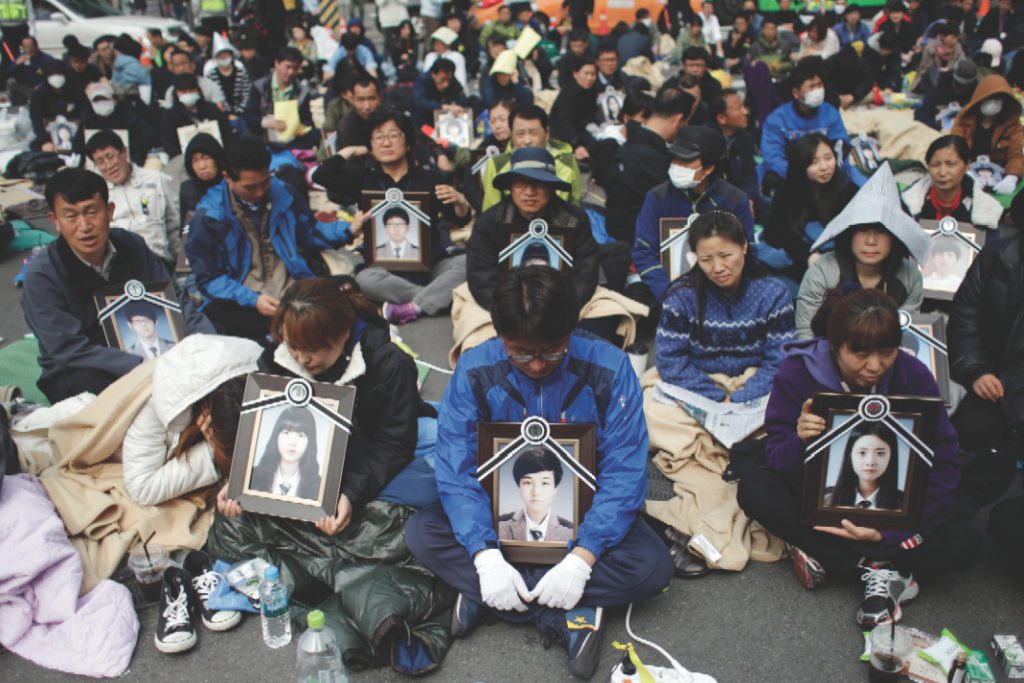A Parent’s Grief
Dr. Esther Oh talks about the importance of getting proper support when grieving the loss of a child.
(Above photo: Family members, holding the portraits of the victims of the sunken ferry Sewol, sit on a street near the presidential Blue House in Seoul on May 9, AP Photo/Lee Jin-man)
It was a parent’s worst nightmare. On April 16, a large ferry carrying 476 people, including more than 300 South Korean high school students on a school trip to Jeju Island, capsized and sank. Only 172 onboard survived, with 80 percent of the dead being second-year students from Danwon High School in Ansan. In the immediate aftermath, I remember reading about the anxious parents camped out at the Paeng Mok Harbor waiting for answers about their then- missing children’s whereabouts. Some parents were making statements that they didn’t want to live without their children, were refusing to eat or sleep, and expressed feelings of guilt, sadness and anger.
Since then, of course, the news only got worse, and no other survivors were found.
The death of a child is one of the most unfathomable things for any parent to imagine, let alone accept. Your child dying before you defies the natural order of life and death. It feels like a huge piece of you has been lost. Your child, after all, represents your hopes and dreams for the future. Such a loss is so overwhelming that parents often forget to take care of themselves.
This period becomes a psychologically vulnerable time, and can increase your risk for depression, suicide, anxiety, marital problems, health issues, substance abuse and dependence, and post-traumatic stress disorder (PTSD). Especially in Asian culture where shame and guilt are typically internalized, the risk for suicide dramatically increases, as seen with the Danwon High School vice principal who survived the ferry disaster only to hang himself out of guilt.
When grieving the loss of any loved one, you will experience a wide range of emotions. They can range from: numbness and emptiness; to guilt because of things you may regret— things that you did or didn’t do; to fear and helplessness as you confront death, a subject many of us don’t want to think about. It’s possible that you may briefly experience hearing or seeing your deceased child.
It’s important to know that every person has a unique grieving process. Take your time and don’t force the process. Most people will go through the five stages of grief (the order and number of stages you experience can vary):
§ Denial
It is usually the first reaction to any loss. It is a natural defense to soften the shock and prevent you from mentally breaking down.
§ Anger
As reality and pain sets in, you may start to feel angry with anyone and anything, including your child who died.
§ Bargaining
Losing a child may create feelings of helplessness and loss of control. You may start to ask “only if” questions that you believe could have prevented the death.
§ Depression
As you mourn the loss and prepare to say your goodbyes, it is a normal reaction to feel deep sadness and experience difficulty functioning day to day.
§ Acceptance
At this stage, you learn to make peace with your child’s death. You move forward and start a life without your child.
Nothing can replace the loss of your child, but there are steps you can take to start to heal:
§Find support from others.
• Join a support group for parents who have also lost their child. Sharing your pain with others who have similar losses can be helpful. They can provide guidance and insight for you based on their own experiences.
• Reach out to friends and family. No one should grieve alone. Connecting with your loved ones, expressing your feelings to them and having them support you will help you to heal.
• Find comfort in your faith. Whether you are a member of a faith organization or not, engaging in spiritual activities such as prayer, meditation or talking to a religious leader can help bring comfort.
§ Don’t be afraid to express your feelings.
In order to heal, you must first acknowledge the pain you are feeling. Avoiding or suppressing your feelings of sadness and loss will only stall your grieving process and can turn into depression, anxiety and health problems. Talking about your painful feelings can be very therapeutic, even if there is nothing you can do to bring your child back. People who don’ t feel comfortable talking about their feelings should try journaling their thoughts, sending a letter to their deceased child or making a photo album of their child’ s life.
§ Take care of yourself.
Being a parent, it’s second nature to put your needs aside. You are used to caring for others. But being a good caretaker means taking care of yourself first. Getting good sleep, eating healthy and exercising are important. Avoid the use of alcohol or drugs to numb the pain, which are temporary solutions that can also pose a danger to you.
§ Seek help from mental health professionals.
Having a trained counselor or therapist to help you get through this very painful time can be helpful. If you feel life isn’t worth living, are unable to perform normal daily activities or have worsening depression, you should consider talking to a professional. (For more severe depression and/or anxiety, medications may be needed.)In some cases, acceptance of this overwhelming loss may be evasive, as you sink further and further into depression and find yourself paralyzed with grief. It’s very important to recognize what we doctors call “complicated grief.” The grieving person may struggle with symptoms like: intrusive thoughts or images of his/her child; denial of the death and imagining he/she is alive; feeling numb and detached from the world; or even suicidal thoughts and no desire to live. It is important to seek professional help when experiencing these symptoms.
Moving forward after your child’s death may feel impossible at first. The Compassionate Friends, a national support group for parents who have lost a child, tells newly bereaved parents that they will never “recover” from such a loss; rather, they are forever changed by it. But, in time, they will find the “new me,” the support group says. In time, as they work through their grief, they will be able to look back on the happy memories with their child, smile again, even laugh again.
Again, each person has his or her own way to grieve and heal, but I share this story about one of my patients, Amy, as a way to offer some hope. After Amy lost her 11-year-old son to cancer four years ago, she struggled with disbelief, sadness and anger. It was difficult to accept that her precious child was gone. But, eventually, she was able to talk about her feelings for her son and her happy memories of him. Eventually, she became an inspirational leader at a local child loss grief support group and also volunteered at the library where her son loved to read. She said she felt a new purpose in her life with these activities, and was also happy that she found a way to keep the memory of her son alive.
Dr. Esther Oh, a psychiatrist at the UCLA Neuropsychiatric Institute, writes a regular mental health column for KoreAm. If you have questions, please email her at editor@charactermedia.com. All correspondence will be strictly confidential and only accessed by Dr. Oh. Opinions expressed here represent those solely of the author.







